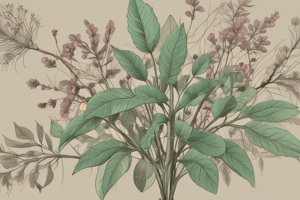Podcast
Questions and Answers
पौधिक भौतिकी का क्या मुख्य उद्देश्य है?
पौधिक भौतिकी का क्या मुख्य उद्देश्य है?
- मिट्टी में पानी की उपलब्धता की जांच
- फोटोसिंथेसिस और विकास की प्रक्रियाओं की जांच (correct)
- मृदा से खनिजों को अवशोषित करने की प्रक्रिया
- रसायनों के संश्लेषण की अध्ययन
क्रॉप साइंस का क्या मुख्य उद्देश्य है?
क्रॉप साइंस का क्या मुख्य उद्देश्य है?
- कृषि प्रौद्योगिकी के उपयोग की अभ्यास
- मिट्टी में संक्रमित माइक्रो-जैविकता की पहचान
- सतत विकास और संरक्षण (correct)
- परमाणु ऊर्जा के संरक्षण की प्रक्रिया
क्या है 'पौधों का प्रजनन'?
क्या है 'पौधों का प्रजनन'?
- नए, सुधारित विभिन्नताओं वाले पौधों का उत्पादन (correct)
- मुक्त-रेडिएशन प्रक्रिया
- नाभिक प्रसार
- पौधों में नर-मादा पुरुष-महिला
'कृषि जैव-प्रौद्योगिकी' से क्या सम्बंधित है?
'कृषि जैव-प्रौद्योगिकी' से क्या सम्बंधित है?
'मिट्टी विज्ञान' में 'मृदा' से सम्बंधित है, 'मृदा' का सही मतलब है:
'मिट्टी विज्ञान' में 'मृदा' से सम्बंधित है, 'मृदा' का सही मतलब है:
'सीमेंस 2' प्रक्रिया में, 'पौधों' में 'लक्षी' होती है. 'लक्षी' का सही मतलब है:
'सीमेंस 2' प्रक्रिया में, 'पौधों' में 'लक्षी' होती है. 'लक्षी' का सही मतलब है:
पारंपरिक मात्स्यिकरण तकनीकों की तुलना में, मध्यकालीन जैव प्रौद्योगिकी कैसे सहायक हो सकती है?
पारंपरिक मात्स्यिकरण तकनीकों की तुलना में, मध्यकालीन जैव प्रौद्योगिकी कैसे सहायक हो सकती है?
किस हेतु से कहा गया है कि कृषि जैव प्रौद्योगिकी वैश्विक भोजन सुरक्षा के चुनौतियों का समाधान हो सकती है?
किस हेतु से कहा गया है कि कृषि जैव प्रौद्योगिकी वैश्विक भोजन सुरक्षा के चुनौतियों का समाधान हो सकती है?
माटि विज्ञान क्या है?
माटि विज्ञान क्या है?
Study Notes
Exploring Agriculture Biology: A Comprehensive Overview
At the intersection of biology and food production, agriculture thrives. As we delve into this integral discipline's subfields, we'll discover the intricacies of plant physiology, crop science, plant breeding, agricultural biotechnology, and soil science.
Plant Physiology
Plant physiology examines the inner workings of plants — from how they take in sunlight to convert it into energy, to how they absorb nutrients from the soil. This subdiscipline of agriculture biology explores the processes that take place within plants, including photosynthesis, respiration, and growth. Understanding plant physiology allows scientists to optimize crop growth and yield, improve plant stress tolerance, and develop strategies to mitigate the effects of climate change on agriculture.
Crop Science
Crop science is the study of plants specifically intended for human consumption or use. Crop scientists focus on various aspects, such as breeding, growth, and management of crops, with the ultimate goal of improving crop yield, quality, and sustainability. Crop science encompasses a wide range of topics, from traditional agriculture techniques to cutting-edge biotechnological approaches.
Plant Breeding
Plant breeding is the practice of crossing and selecting plants to produce new, improved varieties with desirable traits. Traditional plant breeding techniques, such as hybridization and selective breeding, have been used for centuries to develop new crop varieties. However, the advent of modern biotechnology has expanded the tools available for plant breeders, leading to the development of genetically modified organisms (GMOs) and other advanced breeding techniques.
Agricultural Biotechnology
Agricultural biotechnology combines modern biological techniques with traditional plant breeding methods to produce new, improved crop varieties. These techniques include genetic engineering, marker-assisted selection, and genomic selection, all of which aim to enhance crop yield, improve stress tolerance, and promote sustainable agriculture practices. Agricultural biotechnology has been instrumental in addressing global food security challenges, as it allows scientists to develop crops that are more resistant to pests and diseases and that are capable of growing in challenging environmental conditions.
Soil Science
Soil science is the study of soil as a natural resource and its characteristics, properties, formation, distribution, and management. Soil is essential to agriculture, as it provides the foundation for plant growth and the water and nutrients that plants need to thrive. Soil scientists study soil characteristics such as texture, structure, fertility, and water-holding capacity, with the goal of understanding how to manage and improve soil to enhance crop production and sustainability.
Conclusion
Agriculture biology is a dynamic and interdisciplinary field that brings together the best of science and technology to address the challenges of global food security, environmental sustainability, and climate change. As scientists continue to explore the subfields of plant physiology, crop science, plant breeding, agricultural biotechnology, and soil science, our understanding of agriculture biology will grow, leading to new innovations and breakthroughs in food production, crop management, and sustainable agricultural practices.
Studying That Suits You
Use AI to generate personalized quizzes and flashcards to suit your learning preferences.
Description
Test your knowledge on plant physiology, crop science, plant breeding, agricultural biotechnology, and soil science in the realm of agriculture biology. Dive into the intricacies of how plants function, how crops are managed, and the innovative techniques used to enhance crop yield and sustainability.




